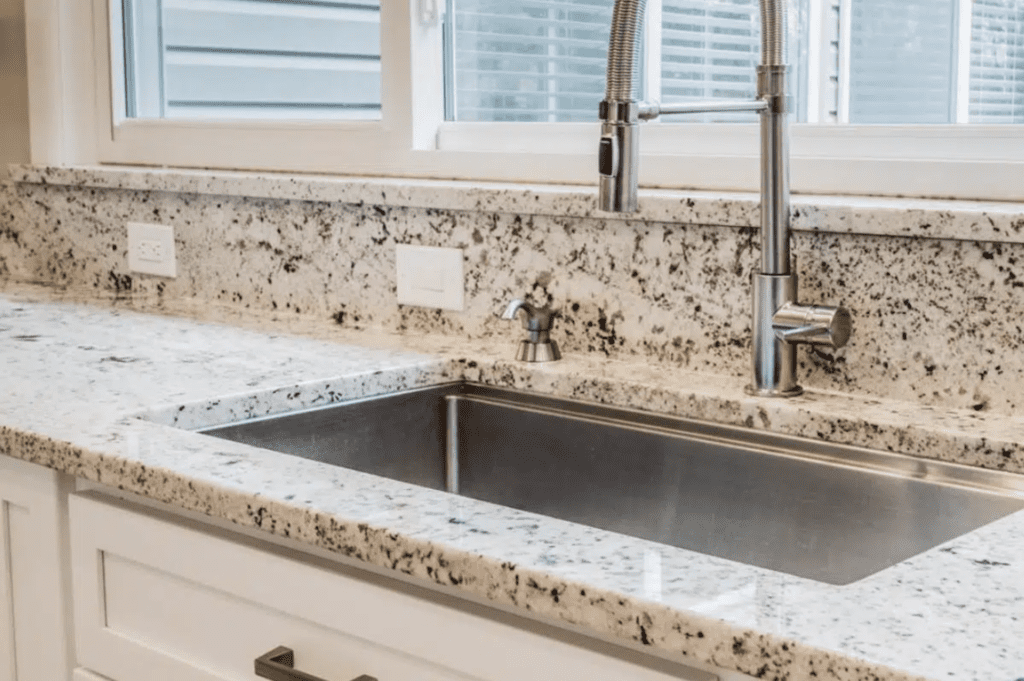
We know that you cannot go wrong with stunning granite countertops when it comes to adding a dash of glam to your home. Apart from looking spectacular, granite comes in a range of colors, each with depth, flecks, and swirls that give it a unique character and make it the focal point of any room. In addition, this natural stone is quarried straight from the earth, is highly durable, long-lasting, and resistant to stains, scratches, and moisture, making it a homeowner’s dream material. But with all these fantastic advantages the stone has, one thing you do need to remember is that not all granite slabs are created equal. And to get all the benefits this stone offers, you need to pay close attention to the quality of the stone you pick.
Granite isn’t a cheap option, so the allure of cutting corners while still showcasing this countertop in your home is tempting, but in the long run, cheap granite countertop slabs will set you back more in terms of cost and function. So, how do you pick a high-quality slab? We tell you how to do just this.
Understanding Different Grades of Granite
Granite comes in multiple grades, which makes it easier to differentiate between the slabs. These range from cheap granite countertops slabs to higher-end options.
When shopping for granite you may find vendors supply different “grades” of granite. It may be levels 1,2,3 or A, B, C. Long story short, these are simply categories that the fabricator creates to simplify pricing. Technically, they should have no indication of the overall quality of the granite.
Factors that typically affect the “grade” of the material are consistency (slab yield), abundance, where it is quarried from, and overall cost of purchase. What you’re looking for as the differentiating factors are veins, the pitting you can see, colors, porosity, thickness, how it appears visually, and other similar markers. For instance, if you talk about thickness, the stones are naturally very thick when quarried from the earth. But manufacturers often cut them to make them easier to handle. However, they can lose much of their durability if cut too thin. You also want to watch out for slabs that are too porous, which means they will absorb more water and stain faster, which means higher upkeep in the long run.
Importing slabs can add to the cost, and it’s important to see where a slab originates. You can look at the different granite stones as though you are looking at wood. Oak is very hard, whereas pine is a little softer. Different granite materials have different strengths and weaknesses. For example, steel gray granite is an incredibly dense and highly durable stone. It does not require any sealer, as the sealer would not absorb, instead sitting on the surface and getting sticky. However, ivory fantasy is a very porous stone that requires extensive sealing and is more prone to staining.
Another example would be fissures, pits, and other natural imperfections. With some materials, fissures should be expected and can be seen and felt, whereas others should be free of any stone fissures. Once installed properly, these natural imperfections should not affect your countertops’ durability or longevity; they should be simply cosmetic details. A good countertop fabricator will review these details to ensure you understand the product you are purchasing. It is important to find a granite countertop fabricator near you that you can trust. A good granite fabricator will advise you on which stone best suits your lifestyle and taste.
What Is a High-Quality Granite Countertop?
High-Quality Resin: Most granite countertops have a resin that brings more consistency to the finish, stain resistance, and overall structural integrity. Often when materials are cheaper, lower quality resins are used, which can deteriorate over time.
Thicker Material: High-quality granite countertops are typically 3 centimeters (1 ¼”) thick. 2-centimeter materials are thinner, thus more prone to breaking as the home settles. All though there are times when a 2-centimeter material can be beneficial for specific custom-built-up designs, this is rare.
Precision Fabrication: The fabrication process is a large part of the overall “quality” of the granite countertop. Fabrication machines, seam locations, slab layout, glues that are used, and setting techniques for sinks and other anchoring systems will all determine the longevity of your countertops. The best results will come from a completely digital facility where lasers do all the templates, which format into a digital file and plug into a CNC machine for precision manufacturing your granite countertops. Another aspect is the installation phase. For example, pure silicone should be used around the perimeter of the countertop, sink connections, and between the countertop and stone backsplash. Often companies use regular caulk to cut costs which will not provide the support or water sealing required for professional results.
High-Quality Sealer: There are many sealers for granite countertops on the market. Water-based, oil-based, silicone-based, and so on. Silicone-based impregnating sealer is typically the best product to be used for granite countertops as it absorbs into the stone as opposed to sitting on the surface.
Contact Us Today
Adding granite countertops to your home is an investment, and like all investments, you need to put a lot of care, thought, and research into the decision. At GranitePro, we know our slabs and how to match the right kind of countertops to the right homes while keeping in mind everything from the use of the countertops to the design and layout of your home. Contact us today to see how we can help you install the highest quality countertops in your home to ensure you get both aesthetics with functionality and, above all, safety.
